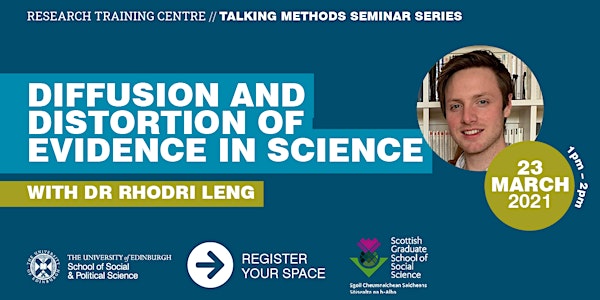
Registrations are closed
We are no longer taking bookings for this seminar. Please visit the RTC website (research-training-centre.sps.ed.ac.uk) to find out more about future seminars and training opportunities.
Diffusion and Distortion of Evidence in Science
In this webinar, Dr Rhodri Leng will outline some of the biases that shape how published evidence spreads through scientific literature.
Date and time
Location
Online
About this event
This webinar forms part of the Research Training Centre's Talking Methods seminar series delivered in association with the Scottish Graduate School of Social Science (SGSSS).
Abstract
In this webinar, Dr Rhodri Leng will outline some of the biases that shape how published evidence spreads through scientific literature, and how this influences scientific understanding. The seminar will begin with a discussion of claim-specific citation network analysis. By representing citation links between papers as a network in which both papers and citations are classified by their content, the spread of findings and their interpretations can be studied. Dr Leng will then discuss the results of recent research regarding: i) selective citation – the tendency to cite findings that support a preferred claim while ignoring inconvenient evidence; ii) citation distortions – the introduction of errors in the interpretation of a previous study via inaccurate citation; and iii) citation cascades – the propagation of evidence and interpretation from one paper to another. These findings will be contextualized in light of theories of reference behaviour and the importance of methods of systematic search and review for avoiding these problems will be discussed.
Biography
Dr Rhodri Leng is a quantitative sociologist of science. His research concerns developing understanding of how the structure of citation networks affects the spread of information across the scientific literature, how the spread of information affects the development of scientific opinion, and involves integrating this understanding into theories of scientific development. An important element of his work involves developing methods to detect citation bias and other citation distortions in the literature. This involves methods of systematic literature retrieval, systematic review and meta-analysis, citation network analysis, and content analysis.
Profile: http://www.sps.ed.ac.uk/staff/science_technology_and_innovation_studies/rhodri_leng